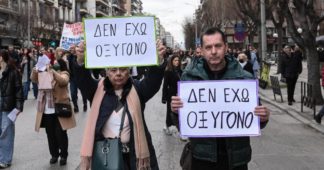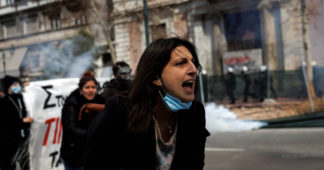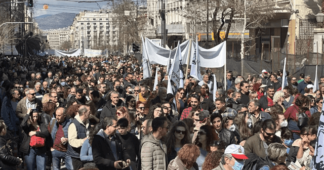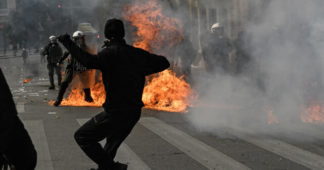By John Vassilopoulos
Feb 14, 2025
Protests continue in Greece, following the mass demonstrations in the country and internationally at the end of January to demand justice for the deaths of 57 people in the 2023 Tempi train crash and an end to a government cover-up.
Thousands of high school and university students took to the streets nationwide on February 7, with protests held in the capital Athens, the second city Thessaloniki, as well as in Larissa, Patras, Serres, Volos, Chania and Heraklion. (See Athens protest in video below)
The secondary school trade union federation OLME called a three-hour work stoppage to coincide with the student demonstrations.
January’s protests were sparked by the release of harrowing audio footage indicating that around 30 of the 57 victims were still alive for a period after the crash. They likely died due to asphyxiation or burns, as the collision caused a massive explosion and set the front carriages ablaze. A young woman passenger who called the 112 European emergency number to report the incident is heard gasping in her final moments, “I have no oxygen”. Her words were adopted as the main slogan of the January protests.
Three days after the January 26 protests the conservative New Democracy (ND) government was in full damage limitation mode with Prime Minister Kyriakos Mitsotakis giving an interview on Alpha TV’s evening news programme. Far from salvaging his position Mitsotakis implicated himself more deeply. He negated his previous narrative that all claims of a cover-up were “conspiracy theories”, stating that “Based on what I know today I would never have said what I did at the time.” This related to his previous claim that there was no flammable material onboard the freight train that crashed into the passenger train, creating the huge fireball and killing more people than in the initial collision.
Immediately after the crash, about 300 cubic metres of earth was immediately removed—“without any authority providing approval”, according to a report sent to the Greek Parliament by a prosecutor, and the area covered up with gravel—likely to conceal the fact that the freight train that crashed into the passenger train was carrying illegal flammable material that caused the explosion. Mitsotakis claimed, “If certain operational decisions were made to stabilize the ground, to allow a crane to lift the train and see what was underneath, I do not know about them, nor am I supposed to. But I am sure that everything was done with good intentions. And the intention at that moment was not to cover anything up.”
His already flimsy claims began to come apart just one day later when crime reporter Vassilis Lambropoulos revealed on Mega Channel details from written statements made by police officers in charge of the site following the crash. According to Lambropoulos, “police officers were called to meeting on the evening of March 3, three days after the accident, on the site of the tragedy where a series of government officials put pressure on them, despite the fact they said that the area should not be covered with gravel given that autopsies were under process and that the go ahead could only be given by court authorities, which in the end were by-passed.”
Among the government officials named as present were Christos Triantopoulos, a minister at the prime minister’s office at the time and Transport Ministry official Yiannis Xifafas.
Triantopoulos’ leading role in the cover-up was clear from the off. In an interview in March 2023, just a few weeks after the crash, he stated, “I happened to be [at the site of the crash] for five days to manage the situation on the prime minister’s orders.”
Reports that the crash area was covered up on the government’s orders began to surface in May last year, with relatives pressing charges against Triantopoulos for his role in this.
In response to the revelations, the social democratic PASOK called a motion for the setting up of a parliamentary inquiry into Triantopoulos’ role in the cover up, following which he resigned from the government. Charges against Triantopoulos had already been submitted by the courts to parliament to approve last August, in accordance with Greek law regarding criminal proceedings against sitting ministers. The story was broken at the time by the conservative daily Estia but was not widely reported. But the then Speaker of the Parliament, ND MP Konstantinos Tasoulas, did not put the charges before the assembly. More devastating still was that he was aided in this by the pseudo-left Syriza (Coalition of the Radical Left) whose leading officials were fully briefed on the charges.
This was made clear by deputy parliamentary speaker and Syriza MP Olga Gerovasili last week who stated that “the charges were studied by Syriza’s legal team.” She added that “we thought it would be premature to take action until more material came along” and confirmed that the case file was never announced in parliament.
Gerovasili justified this breach of protocol by claiming that “parliamentary rules are not clear on whether such material should be announced and that this can be done at one’s discretion.” She concluded of Syriza’s inaction that “having looked at all the evidence we came to the conclusion that there was only one misdemeanour committed.”
In a post on Twitter/X Association of Relatives of Tempi Victims representative Maria Karystianou was scathing of Gerovasili saying that “your deceptive statement today aiming to prop up a liable and exposed government casts serious doubts on your own motives.”
While the Tempi crash happened on ND’s watch, Syriza is just as keen to shut down the investigation because it is just as implicated in the crime along with all previous conservative and social democratic administrations which ran Greece’s railways into the ground, making them unsafe. This is recognised in the protests with one of the chants of last week student mobilisations: “Syriza, PASOK, New Democracy this crime has a history!”.
With the government’s narrative unravelling efforts to maintain the cover-up are continuing. Last week new video surveillance footage emerged that was handed over to judicial authorities by the lawyer representing the security company contracted to manage the railway’s video surveillance system.
The videos purport to show the freight train on the night of the accident with no tanker or any visible cargo in the first three railcars. With the videos made public by pro-government journalist Aris Portosalte on his X account it was clear that their release was part of an orchestrated effort to prop up the official narrative that the explosion was caused by the silicone oil from the passenger train’s transformers.
This narrative was not only disproved by the report commissioned by the families of the victims, but also by an additional report by the Athens Technical University which also dismissed the silicone oils as the source of the explosion. Speaking to Greek financial journal Naftemporiki this week Kostas Lakafosis, one of the experts appointed by the families, stated, “The Athens Technical University was asked some very specific and very clear things which have nothing to do with the videos. Can the silicone oils cause this outcome? This giant fireball with 80 metre diameter that lasted 10 seconds?”
This week Pavlos Aslanidis, who lost his son Dimitris in the crash told ANT1 TV of the sudden appearance of the train footage, “They probably want to shift the focus away from the explosion and the fire that claimed 27 lives. It’s a diversion.”
The lawyer representing the families, Stelios Sourlas told Mega Channel’s news bulletin this week, “I directly dispute the authenticity of the videos.” He demanded the videos be authenticated by the Criminal Investigation Department rather than the experts appointed by appellate-level investigating magistrate Sotiris Baikamis, given that “they are the same ones that concluded that the explosion was caused by the silicone oils.” Baikamis’ team authenticated the videos on Thursday.
Research by public opinion research institute Public Issue established that the initial Tempi protests in January 2023 were even larger than the mass protests that erupted in Greece against Pasok’s austerity in 2011 and also bigger than those against the Syriza government’s brutal pension cuts and other austerity measures in 2016. A Public Issue graphic on the research (see below) concluded, “Excluding under 17s it is estimated that 2.5 million people participated in actions for Tempi in 2023 after the crash”.
Η πανελλαδική κοινωνική κινητοποίηση, που προκάλεσαν τα #Τεμπη, αποτελεί ρεκόρ 12ετίας, αντίστοιχη με 2011. Χωρίς τους μαθητές, υπολογίζεται ότι περίπου 2,5 εκ πολίτες συμμετείχαν σε απεργίες/διαδηλώσεις/πορείες τον τελευταίο μήνα #δημοσκοπηση #δημοσκοπησεις #απεργια #πορεια pic.twitter.com/h9eRY18mPN
— Public Issue (@publicissue) March 20, 2023
Greece’s population is just over 10 million and the figure of 2.5 million—a quarter of the population—excludes the many young people who demonstrated against the deaths that occured aboard a train packed with students. The palpable wave of anger broadening after two years over the Tempi crime and its cover-up threatens to bring down Mitsotakis’ government. The anger at Tempi coalesces with rising discontent over continuing austerity, rising inequality and attacks on democratic rights and has caused disquiet in Greece’s ruling circles.
The most ominous warning to the ruling class was offered by Manolis Kottakis, editor of Estia, Greece’s oldest daily. In Wednesday’s edition he wrote, “What those who are cooped up in offices don’t understand is that while a possible acquittal verdict by the judicial review on the freight train may mean that some will escape the dock, the wave of protests and citizens’ anger over the cover up will grow so that in the end they will all end up on the dock of popular judgement. The tectonic plates of the electorate have already begun to quietly shift. The following should not be underestimated. The more you coil a spring to implement a cover up the higher it jumps when it’s released. This is a law.”
Another indication of concern is that after the ADEDY public sector trade union federation called a 24-hour general strike on February 28, to coincide with the second anniversary of the crash, the private sector GSEE has been forced to follow suit. Whenever the trade union bureaucracy call a general strike, it is a sign that they fear an escalation of the class struggle that could spiral out of their control.
We remind our readers that publication of articles on our site does not mean that we agree with what is written. Our policy is to publish anything which we consider of interest, so as to assist our readers in forming their opinions. Sometimes we even publish articles with which we totally disagree, since we believe it is important for our readers to be informed on as wide a spectrum of views as possible.











